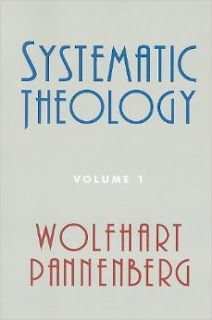Chapter 1

In Chapter 1, Pannenberg wants to explore the way in which truth needs to be the theme of any exploration into Christian teaching. If one reads this chapter carefully, the result will be a thorough grasp of the approach to the theological task that Pannenberg will develop throughout the three volumes. For example, “theology” refers to the divine as the all-embracing founding principle of all being. In Plato, illumination is the result of dialectical reasoning. He will want to stress that God makes possible the knowledge of God through revelation. Truth is the theme of theology, and not just the training of the leaders of the church. Theology is not simply a “practical” or “moral” discipline. Therefore, theology has a deep ambiguity in that it may be nothing more than human talk and therefore not be theology at all. Theology, he thinks, must include the act of advocating for the truth of Christian discourse about God. As such, it must be able to f...
